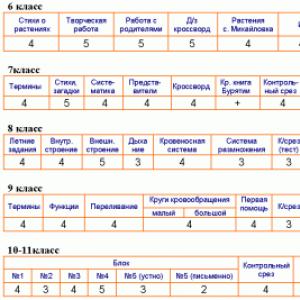Voice assistant Alexa: thousands of problems - one solution. Amazon Alexa ecosystem - overview of everything that can work with Alexa Echo Alexa voice assistant

Any “advanced” smartphone user probably knows what a voice assistant is today. If you have a more or less new Android, most often it’s enough just to say “Ok Google” (or click on the microphone next to the search bar). iOS users are most often familiar with Siri, which is easy to summon by long pressing the Home button. But then, who is Alexa and what makes her different?
A little history
In November 2014, Amazon introduced the world to a new technological gadget - Amazon Echo. The gadget is a tall cone, which has a built-in quite powerful and high-quality bluetooth speaker and microphones. At that time it was the first device of this type, and almost no one understood its purpose. And it cost a lot - almost 200 dollars. ( For example, Stylus sells it here, but - editor's note).

Amazon Echo: the first smart speaker to support Alexa voice service
True, for especially loyal Amazon customers - members of the Prime program, it was available for a short time for 100 bucks. A year after its release, Amazon expanded its line of smart assistants by adding 2 more devices:
Essentially the same Echo, but designed for use with an external speaker connected via both Bluetooth and an audio cable. Although a low-power speaker is also present in the device itself. The initial price of the device was about one hundred dollars, but six months later the second generation of the device was released for 50 dollars.

Amazon Dot: a stripped-down version of Echo, designed for connection to an external speaker
Amazon Tap: Also a stripped-down Amazon Echo speaker, in which they left a high-quality speaker, but removed, as for me, the most important “feature” of the device - microphones that are always ready to listen to your orders. In this column, to “call” the assistant, you need to press the button.
 Amazon Tap: a simplified version of Echo, you only need to press a button to call the assistant
Amazon Tap: a simplified version of Echo, you only need to press a button to call the assistant
In addition to its own devices, Amazon has given other manufacturers the ability to "embed" their voice assistant into their devices - like the Invoxia Triby radio or even the LG Smart Instaview Fridge.
Well, at the end of 2016 Google entered this market with its smart speaker Google Home costing $129 dollars.
 Competitor Google's Amazon Echo
Competitor Google's Amazon Echo
Why do I need this and what can a voice assistant do?
Attention: Both services are not officially available in Ukraine, so you need to understand that neither of them yet speaks either Russian, or, especially, Ukrainian. Both services are designed by default for the US market (Amazon also serves the UK), so most of the services that require your geolocation will not be available. Also, many additional services are officially available only in the USA....
The main “feature” of these devices is that by default they always listen to you (not like some of your relatives!). Each of them has their own “magic word”: Alexa, Echo or Amazon to choose from for devices from Amazon or “Ok, Google” for Google Home, upon hearing which they are ready to carry out your orders. Let's look at what they can do “out of the box” (arranged in terms of usefulness for “our person”:
- Play music from online streaming services. So, Amazon Alexa can play music from Amazon Music, Amazon Music Unlimited and Spotify. Google Home - from Google Music and Spotify. Both can also play radio stations from TuneIn. Amazon also offers you access to the Audible service, which has many audiobooks available (for an additional fee), in English of course. For me now this is the main use of the assistant - even my three-year-old son has learned the key phrase “Alexa play Peppa Pig Song”. My wife often listens to American top charts, but I prefer old-school rock classics. We have a Spotify account connected, which contains almost any music, except that it’s not always possible to pronounce Russian band names - sometimes you have to launch it from your phone through the application (Aleksa, play OKEAN ELZY - understands it once out of five).
- Access to your Google calendar - both columns can read events from your calendar (if, of course, they are written in English). Interestingly, only Amazon Alexa can add events so far.
- Easy access to Wikipedia and search. Both services can answer simple questions like “What is gravitsap” or “What is 2+2?” At the same time, Alexa uses Bing for search, unlike Google Home.
- Clock (“Alexa, what time is it now in New York?”), timer, weather forecast.
- Each of the devices has a considerable list (Alexa is larger, Google is smaller) of smart home devices with which it can be connected. Thanks to this, you can easily turn on/off the lights in the house (if you have smart lamps from Phillips with the sweet name Hue), turn on the TV (if you have a Logitech Harmony smart remote control) and even make coffee (using the Behmor connected coffee maker).
- Each device has its own IFTTT channel, which allows an experienced user to customize voice commands for themselves.
- For Amazon devices, more than 300 “external” add-ons (they call them Skills) from third-party manufacturers are already available, with the help of which the speaker will become even “smarter.” For example, you can ask a rabbi for advice, call an Uber, or play various voice games. You can also ask Alexa to find the desired recipe for you on the Internet. Google Home promised to introduce something similar at the beginning of 2017, but we’re still waiting.
- Google Home has one more feature - it can “interact” with other Google devices - Chromecast (both audio and video). Thanks to this, you can ask Google Home to show you the desired video on your TV (you need to know exactly what it is called) or a movie from Netflix.
So I don’t understand, do I need it?
I admit, so far in Ukraine such assistants are in most cases just a smart speaker that can play the music you ask it to. But even for this purpose you will have to “try” - using the same Spotify in Ukraine is not easy. ( We have a separate article on how to connect Spotify in our conditions - editor's note). Or it will help those who have many of the latest generation smart home devices by adding voice control to them. But, as soon as one of them adds support for the Russian language and services relevant to Ukraine, the possibilities for use will become many times greater. The voice interface on the Internet is really convenient, but for now you need to “adapt” too much to it.
Personal experience
As a true geek, I didn’t resist the temptation of ordering a voice assistant for long. I felt sorry for it for 200 bucks, but when it started costing a hundred, I couldn’t resist. This is how Amazon Dot (first generation) settled in my house. And he has been living there for almost a year. To fully use it, I had to make several feints with my ears, namely:
- Pay for access to a special proxy server tunlr.com for a year ($10 per year). It very easily sets up a tunnel from your router to American resources, posing as a respectable American.
- Buy premium family access to the coolest music service Spotify, which has all the music I’m interested in and supports Amazon Echo (unlike Google Music). I bought it for $30 on ebay, theoretically a “Filipino family” can be found cheaper.
I use Amazon Dot mainly to play music; both adults and children learned to order it at home. I tried to listen to audiobooks, but it’s still difficult to understand in English.
I continue to lick my lips at Google Home, but for now I’m waiting for it to speak Russian.
For those who want to know more
- How to use Spotify if you don't live in the US or Western Europe
- Ukrainian forced Google and Amazon assistants to endlessly ask each other questions (video)
Called Alexa. We publish an abridged translation of her essay.
I first met Alexa at my friends' vacation home in New England. Alexa is artificial intelligence with a mechanical voice that resides inside a small Amazon Echo audio device. “It’s 23 degrees outside right now,” Alexa said and added that no precipitation is expected today. Our meeting took place a year ago; before that I had never seen such a talking device. When I decided to tease my friend about his addiction to gadgets, he showed me what else Alexa can do: tell the weather, make a shopping list, order goods from Amazon. Alexa is smart, just like my friends' house. She knows how to play music and helps with housework - like a little butler.
In the spring, I decided to try for myself what Alexa is and install it for my although cozy, but far from smart home. In theory, Alexa can turn on the lights at your request, as well as open or close the garage door and turn on the heating. I live in a pre-war house without an elevator. The switch is usually always at hand. I don't have a garage. And I control the temperature in the apartment using an old battery, an open window and letters to the building management - all these things are incompatible with Alexa. Alas, the brain of my house is me.
I'm usually resistant to new technologies, considering them to be some kind of excess (which is why my attempt to build a future with Alexa took place in a room decorated with modest bookshelves and various stands). Whenever I get a new thing, I always like it - for example, I now constantly talk to the Notes app on my . But this time I was a little wary of Amazon. This is another thing - it can be a source, a savior, a weasel and a brute with delusions of grandeur. I'm nervous about all those buttons to order the product I want, especially when Amazon delivers items on Sundays (on weekends, I always hear the mailboxes near my house beeping: something's arrived from Amazon!). I decided that I wanted to chat with Alexa about music and discuss news, but under no circumstances order anything. So I went to Amazon and ordered an Echo.
Our communication started a little awkwardly: sometimes you forget why you wanted to communicate with the talking speaker in the first place. I asked Alexa to play something from the Velvet Underground. “I choose songs from the Velvet Under-ground repertoire,” she replied. The sound of a live concert could be heard. Oh oh. “I hope this is a recording of the Kansas show,” I grumbled. This is what she turned out to be. When your player randomly plays the right song, you feel an unusual feeling of a sign from above. At that moment, I felt in the same way that this talking speaker was destined to be in my home.
Amazon is trying to help create a pleasant atmosphere in the home, so it sends its customers tips on how to better communicate with Alexa - just like an annoying parent. For example, “ask Alexa to tell you an Independence Day joke or some interesting fact.” I asked her twice for the latter, and she gave me: “Octopuses have three hearts,” and then “jellyfish make up 40% of the biomass that inhabits the oceans.” Well, thank you, robot friend!
Just like when talking to a living person, the safest thing to do is talk about the weather. Ask about it and Alexa will tell you about it. She does an excellent job of setting various timers. If you say “Good morning, Alexa!”, she might say something interesting, such as that today is International Literacy Day, Geek Day, or that Harry Truman made his first presidential speech on television in 1947 (“ And I’m glad to contact you,” Alexa added embarrassedly).

Image: Andy Rementer
But with news it’s more complicated. Alexa offers to listen to “brief news” - a summary of information that the media is experimenting with, and often inserts news about some kind of SIM cards for the ears.
When you live with Alexa, the main thing is to learn what she's good at. She's bad at acting like a person. You ask her: “Alexa, what should I have for dinner?” And she will start telling you about vegetables and pizza (in her opinion, this should be fun). And if you ask to tell a joke, you will greatly regret it later.
One day I wanted to hear a joke about the Olympics. “Why did the geologist come to the Olympics?” asked Alexa.
If you ask “Why?”, as you would in a conversation with a real person, the robot will tell the second half of the joke: “He thought he could get gold.”
. “Za-a-alato” - that’s exactly how she pronounced the last word. In short, it didn't work out very well.
In one of the emails, Amazon advised asking Alexa to sing “Happy Birthday to You” (Wow, Alexa can sing!). At that moment, the song Naked If I Want To by Cat Power was playing. Instead of turning it off, Alexa sang “Happy Birthday to You” right in the background. It sounded very gloomy. Just perfect for a solo celebration with a toque and a cupcake.
But Alexa still plays music perfectly. Want to listen to John Philip Sousa, Scratch Acid or Loretta Lynn? Ask Alexa to play their music and see what song it chooses for you. She's usually good at recognizing artist names, but when I named the band Frøkedal, she turned on Band of Skulls. You can select a specific song or album: West Side Story, Monster Mash, Revolver. If you tell Alexa to play a Beatles album, she won't choose Drive My Car or Hey Jude, but will play something of her choice from the White Album. And if you ask to play any song from the Beatles, you will hear Why Don’t We Do It in the Road? According to Alexa, The Beatles album is the most Beatlesque of all. Perhaps she's right.

“Sorry, I didn’t understand your question.” Still from the TV series Mr. Robot.
Voice control, as opposed to pointing at a screen, helps you connect with your personality. And that's just great. One weekend I said out loud that I wanted to listen to the Grateful Dead (even though I've always disliked that band) - and Alexa turned on that one song, which I was thinking about. I ended up listening to the Grateful Dead all morning. Their music was reminiscent of the 70s country rock I heard a lot as a kid. And I liked it.
I have a whole bunch of playlists on Spotify created for different moods. I made a special playlist that plays when I come home - this is how I drive away the bad memories of breaking into my apartment. When I'm going to town, I ask Alexa to play the "Going to Town" playlist, and the music puts me in the right mood. Gordon McRae plays in the morning, Wham! and the Kinks. Before going to bed, I leave the lights dim and ask them to turn on the playlist " Good night", and the apartment is filled with pleasant Beatles music.
But there are also unpleasant situations when the wrong song comes on that you want to hear. When you give commands out loud, it's easy to lose control. In July I had one of my summer playlists on Spotify, a nice mix of Yo La Tengo, Grandmaster Flash, Mungo Jerry and so on. And I was furious when Alexa started playing one of the standard summer selections music from Spotify. I understand that it was just a mistake, but nevertheless, I just got mad.
At that moment I felt victimized. To calm myself down, I asked Alexa to play a list called “Just Breathe” from Amazon Prime. Now, I thought, nothing bad would happen. Suddenly my apartment was filled with wailing New Age sounds that would be best suited for lying in a morgue or a hospital room.
By the end of September, Alexa and I were starting to get along. I realized that she had no sense of humor and stopped asking her to tell a joke. I learned that if you say “Alexa, Good morning” or “Alexa, good afternoon,” then she can answer me pleasantly. She told me interesting facts about jellyfish and whether it would rain today. We both loved The White Album. Then one morning something unusual happened.
“Alexa, good morning!” I said.
“Good morning,” Alexa replied. - Today is the last day of September. I think it's time wake up green day" (Pun: Alexa thus recommended a song by Green Day called Wake Me Up When September Ends - “wake me up when September ends” - editor's note).
Seriously, Alexa made me laugh.
In early October, Google introduced its version of Echo - Google Home. The Times described the device as something that "looks like an air freshener." Google Home connects to your Google email and calendar, and maybe even to an actual air freshener in your home. Well, in the meantime, I keep setting up my old speakers - those giant wooden things with subwoofers and buttons and switches - and my friend recently opened a record store. So I step into the future - one foot is already in it, and the other is in the past, the way I like it.
I recently came across two popular voice assistants. In this review I will talk about what they can do and what they can’t do yet.
Purchase and installation
Google Home now costs $129, Amazon Echo with Alexa is $179. Both, of course, are not sold in Russia. Well, we go to the USA and buy there.
Google Home is offered in 7 different colors of a rag cover that covers the bottom of the device (where the speaker is located). Alexa comes in black and white and is significantly larger and heavier in size than its competitor. Both are made of nice matte plastic. In my personal opinion, Google Home looks like some kind of stump, whereas Bottom part Alexa is like a colander. But there is no arguing about tastes.
But it should be noted that Google Home has an excellent box, you want to open and close it again and again. The product designers did a great job.
Alexa has 2 buttons as external interfaces, and Google has a small invisible touchscreen, which I rarely manage to hit. However, these buttons are not needed, because all functions can be controlled by voice.
To connect, you need to download the application (the Alexa application had to be installed as an apk, it is not in the Russian store), and set up access to your home Wi-Fi. This is done quite simply, you just need to remember to also turn on bluetooth on your phone. Once connected to your home Wi-Fi, devices quickly link to the application - and you can see how their engines interpret the received phrases.
A little about safety. As is known, “the S in IoT stands for Security”. Assistants are linked to your personal account, but do not recognize the owner’s voice. Anyone can use them to read your mail and whatever else you entrusted to them.
Speech recognition
Call pattern recognition (“OK, Google” and “Alexa”) occurs locally, while phrase recognition and response generation occurs in the cloud. If we consider them as hubs for management smart home, then here lies the fundamental difference between these platforms and HomeKit, which can work offline. It has never happened to me that assistants did not recognize their name. But it has happened more than once that something else was adopted as a name.
Google understands Central Russian English for my wife and I very well. Almost all simple phrases are recognized correctly on the first try, which cannot be said about Alex. Below I tried to say a rather difficult word to her:
- Alexa, what’s under rubber new riddle?
- Alexa, what is them to bring new rail?
- Alexa, what is an tripper no real?
Ok, let's simplify the question
- Alexa, what is interpret priner?
- Alexa, what is an Trump renewal?
- Alexa, what is an to pandora?
Let's go from the other side
- Alexa, what is a synonym for businessman?
- Business’s synonyms include business executive and business person.
Okay, honey. For those interested, the original word was entrepreneurial.
Let's have a casual conversation
Both assistants have a built-in extensive set of preset phrases and responses. No one to talk to about love, about life? Robots at your service. For example, both can be asked to “tell me a joke”. They have a wide range of jokes, but none of the jokes seemed funny to me. I think insidious neural networks are just pretending to be dumber than they are.
- Alexa, who killed Kenny?
- Oh my god, they killed Kenny!
- OK, Google, are you robot?
- I prefer to think of myself as your friend
- Alexa, what is the purpose of life?
- The answer is 42, but the question is far more complicated
- OK, Google, what is your gender?
- I am all inclusive
- Alexa, does Santa exist?
- I don’t know him personally, but I heard a lot of good things about Santa
- OK, Google, tell me a story
- One there lived a protagonist and some supporting characters. Together they went on a journey. And twist ending, it was all a dream!
- Alexa, am I funny
- I don’t have a sense of humor so it’s hard for me to tell
And here she definitely didn’t lie.
Search
Alexa sends questions to bing, and where Google Home sends them is easy to guess. Both assistants use internet search and Wikipedia quite well to answer questions. In my opinion, Google searches better - it is more flexible with search phrases and more often understands that the query is a search query.
- Alexa, when was Moscow founded?
- Moscow state of establishment was 1147
- OK, Google, what is the greatest number
- According to English Language and Usage, 7 is the smallest and 9 is the greatest number
- Alexa, where is Kilkenny?
- Kilkenny is a city in Kilkenny, Ireland (...)
- OK, Google, which fish is the fastest?
- Sailfish. According to china.org.cn the sailfish is the fastest fish in the world able to speed at a swim speed of 68 miles per hour
So, Boris Borisych, finally dispel your doubts, the AI told us everything.
Out-of-the-box features
Both can tell you what’s on your Google calendar (but they only speak the Latin spelling). They haven't read the mail yet. And glory to the robots, see above about safety.
Google can translate into many languages, Alexa cannot.
- OK, Google, what is ‘Mother washed a frame’ in Russian?
- Mother washed the frame
Both can stream music from popular apps (pay money), as well as radio and news (free). As for music, you need to understand that since the data on the hardware goes through the Cloud, it is difficult to stream it from your phone; there is no such option. Amazon and Google allow you to download a certain number of tracks to your account on their music services for free and play them from there.
Alexa lets you shop on Amazon. You can set a pin code for purchases so that neighbors don’t play games.
- Alexa, shopping
- Would you like to shop?
- Yes
- What would you like to order?
- Books
- Voice ordering is exclusively available for prime members. Would you like me to add Books to Nikolai’s cart instead?
- Yes
Here a set of books appears in the application, you can continue shopping there.
In addition, both have quite a lot of sensible and not very useful features, such as a quiz game, an alarm clock, a calculator, a converter of measures and currencies, Dictionary and so on.
Features with a tambourine
On December 8, the launch of an open API for Google Home was announced. It is said that the mechanism is under Google name Actions will launch in early 2017 and will allow third parties to create dialog scenarios through which the user can access the provider's content or services. Wisely wrote, in general, look how it works in the Alexa Skill Kit, which has existed since mid-2015.
The Alexa app has a store of skills developed by various services, such as Expedia or NASA. A skill is access to services/information of a service through voice commands. You can connect it for free in the store or simply by voice, saying a keyword or phrase.
- Alexa, ask NASA Mars to get me a Curiosity rover update
- Alexa, ask RecipeFinder what I can cook with tuna and cheese
- Here are some more recipes (..) I have included links to the recipes in your cart
Links appear in the application. Not clickable arrrrgh!
The cool thing about skills is that they represent a dialogue that can have quite a lot of development options (unlike IFTTT scripts, which will be discussed later). So far, the number of ratings for skills in the Alexa store is measured in the hundreds, so these are only the first steps in creating voice interfaces. Expedia and Kayak launched their skills, but they do not allow you to book tickets and hotels by voice, you can only look at prices. However, you can book a car on Expedia, order an Uber, and there's even one banking skill that lets you pay bills.
In addition, Alexa and Google have their own IFTTT channel through which you can configure even more functions. IFTTT allows you to create triggers between services like “if service 1 said A, then send command B to service 2.” Almost all Smart Home hardware, several large retail chains (they only allow you to update your online shopping cart) and a million information portals have such a channel. The problem with IFTTT is that all the recipes for Alexa and Google allow you to do something by voice command (notes in a spreadsheet, post on Facebook, turn on the thermostat), but do not allow you to send the connection back (read notes, read Facebook, ask for temperature) . Apparently the developers didn't provide an appropriate API, but I don't understand why. If they can read the calendar, they could also read messages from IFTTT, but no.
Further development
To summarize, I would say that Alexa now has more capabilities than Google due to Skills, but all this can appear in it quite quickly. By the way, a year and a half ago, Amazon launched a $100 million venture fund, the Alexa Fund, to invest in projects using the Alexa voice interface. The fund already has 10 investments, the largest of which is in Ecobee, a thermostat that has either already overtaken or is about to overtake Nest in sales.
Amazon also has the Alexa Voice Service SDK, which allows you to run Alexa on third-party hardware. Google has not yet released a similar SDK; they plan to release it this year.
Overall, the Amazon vs Google competition in the Smart Home field promises to be interesting. While Google failed its attempt to crush platforms and protocols with the unsuccessful Brillo-Weave project, Amazon took the lead with the development of voice interfaces. Google is now forced to catch up, with a delay of about a year and a half. But Google has a higher-quality voice library, and in general it is smarter, better programmed, so the situation is close to parity. If you are reading this article for purely practical purposes and you are not an American, when choosing between two devices, I would suggest buying Google, as it understands better and searches better. Complex conversational interfaces from the Skills Store are of little use if they can't understand you properly.
Tags:
- iot
- amazon
- voice control
- speech recognition
The voice-activated Amazon Echo smart speaker with Alexa is not only a futuristic device, but also practical and affordable. With a rapidly growing list of features, integrations, and use cases, it's hard to imagine the full potential of Echo devices.
Pros:
- “Always Listening” - Just say “Alexa” in the room with the device and give commands, no buttons required
- Superior speech recognition
- Voice control
- Good design
Minuses:
- Russian language is not supported Alexa only works in English, German and Japanese.
- No battery, works only from a wall outlet
- Built-in sound is inferior compared to other speakers in this price range
What is Amazon Echo
Imagine a Bluetooth or Wi-Fi speaker with a voice assistant inside, such as Google Assistant. This is the Amazon Echo with the Alexa voice assistant - the first artificial intelligence to receive its own separate device. She will constantly wait for your commands (“always listening”), answer questions, play music and control devices. Alexa is capable of interacting with third-party apps and even making purchases.

Amazon Echo was released in 2015 and has sold more than 11 million devices in the past two years. Amazon releases updates for Echo every week, and the number of Skills—third-party skill apps—is growing. Now Alexa looks very good compared to Siri and Google assistant, and a separate device with 7 microphones gives it a speech recognition quality that Apple and Google can only envy for now.
Design
The device may look imposing when you take it out of the box, but indoors the Echo looks rather inconspicuous. A black or white cylinder will organically fit into any interior.
Like many other Bluetooth speakers, Echo has 360-degree sound. The speaker grille in the lower half of the device has a laconic and neat design.

On the top surface of the device there is a barely noticeable circle of cutouts for 7 multi-directional microphones, which allow you to receive commands from a user located in any part of the room. There's also a glowing bezel on top that lets you know with a nice blue light when you're talking to the Echo. It's a strangely warm feeling to see Alexa attentively awaiting your request. The glowing bezel will also indicate when the request has been accepted and is being processed.

You'll almost always be using voice commands, but there is manual volume control (by rotating the top of the cylinder) and a microphone mute button.
It's unlikely you'll be moving the Echo from place to place because, unlike most Bluetooth speakers, the device doesn't have a battery and must always be plugged into an outlet. There is also no AUX output (which is present on), so an external audio system can only be connected via Bluetooth.
Enabling and setting
Connecting Echo is easy, even for those just starting to use smart devices. Plug the device into a power outlet, select the network that appears on your computer in the list of Wi-Fi connections with a name in the AMAZON-XXX format, connect to it and enter personal account Alexa login and password for your home Wi-Fi networks. Echo's connection to the Internet is very stable, without any complaints. If any difficulties arise, you can use the connection on our website.
You can transfer many everyday tasks to the device. Set and turn off an alarm clock, a timer while preparing dinner, find out the exchange rate, the meaning of an unfamiliar word, request a summary of an article from Wikipedia. Alexa can be connected to your Google Calendar and manage your schedule.
If you say “Alexa, What’s in the news?” The Flash Briefing, a personalized summary of news from the sources you select, will begin playing. In addition to BBC, CNN and Guardian, you can also install .
You can control with your voice a large number of devices for smart home. For example, turn on the lights in the kitchen “Turn on the lights in the kitchen”. It all works great. All standard Alexa commands can be found here.

There are also Alexa Skills apps from third-party developers. Most of them are kind of boring interesting facts or quotes famous people. But there are also very useful ones, such as Fitbit, translation skill or memory training.
Use in Russia
As we wrote above, at the moment smart speakers from Amazon do not support the Russian language, and it is unknown when they will add Russian. We use Echo on English language– you can choose an American or British dialect, as well as German or Japanese.
In Russia, Echo works well, almost all functions are available from Amazon, with the exception of voice purchases on Amazon for obvious reasons and the music streaming service Amazon Music (which only works in 28 Western countries, but there is an excellent alternative - Spotify, and it works great) . The rest of the features work fine: you can set a Russian address, find out the weather forecast, get answers to help questions from Alexa, install applications and manage smart home devices.
Sound quality and speech recognition
Each of Echo's 7 microphones provides long-range speech recognition. Amazon boasts that their device will hear you even when the music is playing loud enough from the speakers.
Speech recognition has been steadily improving since the Echo's release. Now it works simply incredible, Alexa will understand you, even if you formulate a phrase a little strangely or mumble a couple of words in the request. Even strong The device understands Russian accent perfectly. Basically you won't need to remember or use special commands, you just make the request in the normal form you would address to a person, in most cases Alexa will understand you.

Note that Echo sends all your requests to Amazon servers for recognition and analysis. To improve the quality of recognition of your particular voice in your room, you can run a short training mode for Alexa in the settings.
Smart House
Amazon Echo is already compatible with most popular device manufacturers, such as Philips Hue, WeMo,. If you already have a smart home system with , then most likely Echo also supports your Hub. General rule: Look for the words “Works with Alexa” on gadget boxes. In general, Amazon has a more open and friendly approach towards device manufacturers, unlike, for example, Apple with their HomeKit standard and smart speaker.
Amazon is developing a new feature that will help its Alexa voice assistant distinguish between the voices of individual users, Time reports, citing people with knowledge of the company's plans. An Amazon representative declined to comment on the information received by the site.
Alexa, like Siri and Cortana, can interpret and respond to various voice commands such as “What’s the weather like outside?” or “What are they showing in the cinema today?” However, none of the smart speakers can distinguish between human voices.
Amazon's innovation will allow voice samples to be linked to specific users to confirm their identity.
The owner of the main Amazon Echo account will be able to restrict access to certain commands based on these patterns. For example, it will be possible to make it so that only the voice of one of the adults living in the house can command Alexa to pay with a credit card or turn on the coffee machine.
Amazon has been developing this feature, internally called Voice ID, since the summer of 2015. Last summer, the feature appeared in Amazon's plans, but it is not yet clear when it will launch or whether it will happen at all. The development of the technology itself has already been completed, and now the only question is the integration of the function into the Echo series products.
A number of factors may cause a delay in release, including security issues, Lately having special significance for the company great importance. In particular, Amazon recently refused to hand over the recordings of one of its Echo users to Arkansas State Police investigating a murder that occurred last November. According to the company, such recordings should be protected by the First Amendment to the US Constitution.
The innovation could be useful for those families who use multiple Amazon accounts or want to have separate task lists, said Jan Dawson, chief analyst at Jackdaw Research.
Voice ID could also help the company become a more legitimate competitor to Google with its Google Assistant-enabled Home speakers. On Pixel smartphones, the latter can distinguish the voices of people saying the command “Okay, Google,” while Google Home cannot boast of such an ability.
Subscribe to Quibl on Viber and Telegram to keep abreast of the most interesting events.







